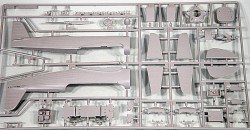
Trumpeter 1/32 Yak-18 Max Kit First Look
By Michael Benolkin
| Date of Review | December 2005 | Manufacturer | Trumpeter |
|---|---|---|---|
| Subject | Yakovlev Yak-18 | Scale | 1/32 |
| Kit Number | 2213 | Primary Media | Styrene |
| Pros | Crisp detailing, simple build | Cons | |
| Skill Level | Intermediate | MSRP (USD) | $36.95 |
First Look
 |
 |
 |
 |
 |
The Yakovlev Yak-18 was evolved from the World War Two Yakovlev trainer, the UT-2. Initially designated as the UT-2MV, the aircraft first flew in 1945 and entered series production in late 1947. Powered by a five-cylinder Shvetsov M-11160 horsepower engine, the Yak-18 featured tandem seating and retractable landing gear. As this was initially designed as a military trainer, the retractable landing gear was not intended to improve performance, rather it was provided to train the student pilot on complex aircraft before turning them loose on higher performance machines.
The Yak-18 evolved over the years with additional power, some with tricycle landing gear, some with four-place cabins in place of the tandem trainer cockpit, and all with improved aerodynamics. One aerodynamic improvement that appeared on a later version of the Yak-18 and remained on all subsequent versions was the round cowling. The round cowling, coupled with shutters to block airflow and allow the engine to keep itself warm at low power settings.
Unlike any of its western counterparts, the Yak-18 entered production in 1947 and remains in production today. The Yak-18 evolved into the Yak-50 and Yak-52 trainers, which are among the more popular warbirds in the west. In addition, the Yak-18 has remained in production in China as well, produced as the CJ-5 and later as the CJ-6.
A word about the name Max – at the height of the cold war, it was rare that the Soviets would release the actual production designator of one of its aircraft, so a naming convention was created so that a name and model could be assigned to an aircraft variant and everyone would know which aircraft variant was being discussed. Trainers and special mission aircraft all started with an M (for some reason), with single syllable words given to propeller-driven aircraft and two-syllable words to turbine powered types. For example, Mongol was the name given to the trainer version of the MiG-21, and Max was the name assigned to the Yak-18.
It is rare to see a mainstream model company produce a trainer kit, especially in 1/32 scale. Nevertheless, Trumpeter is well known for producing kits that other companies fear to try. Such is the case with the Yak-18 Max.
The Trumpeter Yak-18 is molded in the standard light gray styrene and rendered on three trees. The M-11 engine is a kit of its own right and is rendered on a third tree molded in a metallic gray styrene. Two trees of clear parts are also provided, one containing the canopies and instrument panels, the other containing the optional clear cowling so that you can display your detailed M-11 after installation.
Given that the cockpit is highly visible underneath the five-part canopy, Trumpeter has provided a highly detailed cockpit to take advantage of the view. The cockpit comes complete with individual sticks, rudder bars, throttles, mixture controls and propeller RPM controls. There is even an avionics bay aft of the rear seat. The only thing not provided is a set of seat belts/shoulder harnesses.
The rudder, ailerons and elevators are all hinged using the new-standard photo-etched hinges on piano-wire-type shafts.
As I mentioned earlier, the M-11 engine is a detailed model of its own right, with complete renditions of ignition ring, exhaust manifold, magnetos, and engine mounts. After assembling and painting all of these details, it would be a shame to conceal all of that detail inside the conformal cowing. The clear cowling is an interesting option here.
In addition to the rubber tires provided for the main gear and tailwheel, Trumpeter has also provided a set of brake lines molded in rubber as well. Interesting touch!
Assembly of this kit is as simple and straightforward as the real aircraft. The majority of the construction time will be inside that nice cockpit and with that excellent M-11 engine. Otherwise this kit is a quick build.
Markings are provided for Yak-18s in Soviet, Chinese and North Korean service. All three examples provided in the instruction wear the 'uniform' Soviet Green over Light Blue. Fortunately, if you peek in various publications, you'll find Yak-18s in a variety of color schemes, and these are examples were in service in the Soviet Union, not counting the variety of 'warbird' schemes that followed. In Bill Gunston's "Aircraft of the Soviet Union", one photo shows three Yak-18s in formation, one of which appears to be silver.
If that isn't interesting enough, there is also a North Korean Yak-18 that operated as 'Bedcheck Charlie' and flew over allied airspace at night to harrass the UN forces. I believe this aircraft was black...
There do not appear to be any lurking problems in assembly. Trumpeter has taken a simple approach to this kit and it should be an easy build for modelers with a little modeling experience.
Leave it to Trumpeter to tackle a subject that has never appeared before except as a limited production 1/72 scale kit. I am hoping that they'll re-release this kit with the Yak-50 cowling and the minor differences as this opens up color schemes galore! I wonder if we can convince Trumpeter to tackle a 1/32 T-28C Trojan?
My sincere thanks to Stevens International for this review sample!







